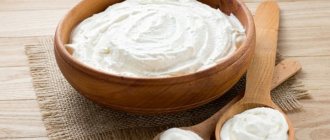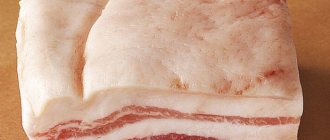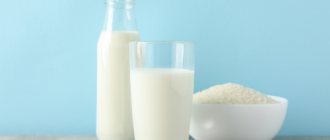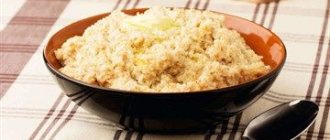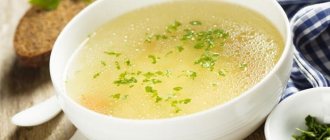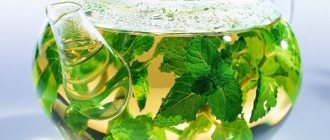What is the difference between goat's milk and cow's milk?
The composition of goat milk has a number of advantages:
- The protein composition of goat's milk is quite similar to cow's milk. The difference is that goat milk contains a smaller amount of one of the protein fractions - alpha-S1-casein. Due to this, goat milk proteins form a softer and more delicate curdled clot in the stomach, which is easier to digest by the child’s immature gastrointestinal tract.
- Goat's milk fats have a higher content of short- and medium-chain fatty acids and are small fat globules (balls), unlike the fat composition of cow's milk, so they are easier to digest and absorb by the body.
- “Goat product” contains more vitamin A and B vitamins and minerals such as Ca, P, Mg, K, Mn, Zn, Se, compared to cow product. But it is low in iron and folic acid.
- As for the carbohydrate composition, goat milk contains 10 times more oligosaccharides than cow milk. Oligosaccharides, being food for the microbiota of the large intestine, stimulate its growth and vital activity.
Beneficial features
The drink contains a large number of useful elements, including vitamins B, A and D, as well as vitamin C or ascorbic acid, high calcium and fluorine content. Despite the fact that the drink is very fatty, fat is easily absorbed in the body and does not harm digestion. Goat milk contains beta casein, not the dangerous alpha protein. That is why it does not cause allergies.
Goat milk performs a number of beneficial functions:
- Strengthens bones and prevents rickets in young children;
- Regulates material metabolism;
- Participates in blood formation;
- Forms and strengthens the immune system;
- Improves the condition of skin and hair;
- Strengthens teeth;
- Helps with stomach ulcers and constipation;
- Stimulates the functioning of nerve cells;
- Positively affects the functioning of the heart;
- Strengthens the walls of blood vessels;
- Cleanses the body and removes harmful substances;
- Improves the functionality of the liver and kidneys;
- Prevents the development of oncology and diabetes;
- Normalizes digestion;
- Develops and tones muscles.
Unlike cow, goat product contains a more homogeneous mass of fats, which improves metabolism and ensures 100% absorption. The only disadvantage of such a drink may be its pungent smell and sour taste. However, such qualities manifest themselves when animals are cared for unscrupulously. If sanitary standards are observed, high-quality goat milk has a mild taste and does not have a strong odor.
Is it possible to give goat milk to a child?
Yes, as mentioned above, whole goat milk is a healthy and easily digestible product with high nutritional value, but it is not suitable for a baby as food. After 6 months, according to the National Feeding Program, whole cow (goat) milk is allowed in small quantities in the diet (as an additive to porridge, for example), but it is still better to introduce whole milk to your baby after a year.
- Goat's milk contains a lot of protein and mineral salts, which creates a high load on the baby's immature intestines, kidneys and pancreas.
- Whole goat milk protein is as common and strong an allergen in the first year of life as cow's milk protein.
- After a year, the situation changes; in most cases, the baby’s immune system is ready to gradually encounter various allergens, and whole goat’s milk in acceptable quantities is usually well tolerated.
Rules for drinking goat milk during lactation
- When breastfeeding, you can start drinking goat's milk after 3-4 weeks after the baby is born;
- Try a small sip the first time. It takes up to 48 hours for food allergy symptoms to appear, so wait two days. If your baby develops an allergy, immediately eliminate the drink from the diet. How to help your baby with a negative reaction to food, read the link https://vskormi.ru/problems-with-baby/pischevaya-allerguya-u-grudnichka/;
- If there are no negative consequences, a nursing mother can drink goat milk;
- At first, dilute the milk by half with water, and then gradually reduce the dose of water until completely eliminated;
- The rate of drink consumption is no more than a glass a day up to two to three times a week;
- Choose a quality product with a good shelf life. It is better if it is homemade milk;
- It is advisable to boil the drink before drinking;
- Do not add goat's milk to tea or coffee;
- The shelf life of goat milk at room temperature is up to 48 hours, in the refrigerator - about a week.
Goat milk is used not only for food.
The drink is known for its beneficial cosmetic properties. Baths of the serum for 30 minutes a day will relieve calluses and cracked heels. Masks and lotions using this product will strengthen the hair and smooth the skin. The skin will be refreshed and rejuvenated, and the hair will be shiny and beautiful. Many breastfeeding mothers face the problem of hair loss after childbirth. How to improve the condition of your hair while breastfeeding, read here. Subscribe to our VKontakte group
Myths about goat milk
Myth 1.
Goat's milk can't be boiled.
This is not true. Such a product can cause various infections, as it may contain various viruses (for example, hepatitis A or tick-borne encephalitis, to which goats and sheep are susceptible), bacteria (staphylococcus, Brucella) and fungi (Candida). Therefore, boiling is the only way to disinfect milk purchased at the market or homemade.
Myth 2. Goat milk has an unpleasant smell and taste.
It is not true. A clean goat, as a rule, produces tasty milk without taste or odor. The animal's nutrition is also important. Some herbs can give a bitter taste.
Myth 3. Goat milk for children needs to be diluted with water.
This is true. When first introducing goat milk into the diet and introducing the baby to goat milk, it is possible to dilute it with water 50:50 and see the body’s reaction and tolerance. Subsequently, the amount of water for dilution can be reduced and gradually switch to whole goat milk.
Is it possible for a nursing mother
Speaking about whether it is possible to consume goat milk during lactation, doctors say that it is not only possible, but also necessary. This is a useful product for a nursing mother, which can saturate the body with vitamins and other useful substances.
Unlike cow's milk, goat's milk does not cause colic or other undesirable changes in the baby. It has a beneficial effect on the children's body.
In addition, it stimulates lactation. Mother's milk becomes more nutritious, the baby gains weight .
It is recommended that lactating women drink goat milk products for the following problems:
- pathologies of the cardiovascular system;
- acne;
- disorders of the gastrointestinal tract;
- pathologies of the thyroid gland;
- dry skin and hair;
- respiratory diseases;
- frequent migraines;
- insomnia;
- lack of vitamins.
What dairy products can breastfeeding mothers take?
The most important question is whether a nursing mother can drink store-bought pasteurized milk or prefer homemade milk? The answer is clear - if the child does not have the unwanted reactions discussed above, then you can take any milk - either homemade or store-bought. Preferences are individual, and the benefits and content of microelements in different types of milk are almost identical.
If there are weak reactions on the part of the baby, then you can exclude whole milk, but leave some dairy products. For example, you can use cottage cheese, kefir, or cook pancakes or omelettes with milk. This concentration of milk will not allow the development of unwanted reactions in the newborn. Can a nursing mother have semolina with milk or buckwheat with milk? It’s definitely possible, because boiled milk is considered less allergenic than whole milk. Is it possible for a mother who is breastfeeding to have cereal with milk if the baby has no reactions? This combination can be dangerous due to the fact that an allergic reaction can potentially develop to gluten, so it is sometimes difficult to determine what exactly the child is reacting to. In such cases, you can take the products separately to determine this. And if you eat cereal with milk, and the child feels great, then you can continue like this.
There is a lot of discussion about whether a mother who is nursing a child can eat condensed milk. Some say that it increases a woman's lactation and milk supply, which has no scientific evidence. Condensed milk contains a lot of saturated fats, which are harmful to the mother’s body and can lead to fat synthesis. This is a very undesirable effect for a woman. Therefore, a nursing mother is allowed to take condensed milk in moderation, but there is little benefit from it.
Can a nursing mother have bird's milk? If a baby has severe symptoms of milk allergy, then no products with traces of formula should be consumed, including dry milk. As for coconut milk, it is a plant extract that does not cause such reactions, so it is allowed to be taken. People also often ask whether honey and milk are allowed for a nursing mother? Honey is a strong allergen and can cause strong reactions in children in the first six months of life. Therefore, if there are cases of allergies to honey in the family, then you definitely should not take the risk.
When talking about the presence of milk in a young mother’s diet during breastfeeding, it is necessary to clearly understand that dairy products must be included in the diet every day. Whole milk has the potential to cause intolerance, in which case its use is limited. But over time, it can be used in the diet in a certain amount, replacing the remaining calcium needs with other dairy products.
Negative reactions when nursing mothers drink milk
The period of breastfeeding is the moment when the mother gives her baby all the beneficial substances that come to him during feeding. And of course, every mother wants all the healthiest vitamins, minerals and microelements to be passed on to her baby through her milk. Therefore, the diet of a young mother while she is feeding her baby should include foods that are the healthiest for the baby. Many people are interested in the question: can a nursing mother have whole milk, and if so, which product is better to give preference? This question is discussed by many mothers, and judging by their experience, all cases are very individual.
Milk is a product that contains proteins, as well as carbohydrates in the form of lactose and many minerals - calcium, phosphorus, iron, manganese. The benefits of such a product are undeniable for any person. But if a woman is breastfeeding, such a composition can not only be beneficial, but can also be dangerous. Can nursing mothers drink milk? It is difficult to give a definite answer to this question, since the approach is very individual. But in any case, milk is allowed for nursing mothers if there is no proven negative effect on the child. The issue of moderate amount of milk is also important so that negative effects do not appear.
What problems might a mother encounter if she has milk in her diet? First of all, these are allergic reactions and lactose intolerance in a child.
The problem of a child's allergy to milk protein is actually not common. Therefore, if there are no reactions to milk in the family, then the mother should under no circumstances refuse milk in advance. In fact, avoidance of cow's milk by a breastfeeding mother may even increase the baby's chance of developing cow's milk allergies. Mothers who drink cow's milk have higher levels of secretory IgA in their breast milk. Breast milk with high IgA blocks the absorption of undigested cow's milk protein by intestinal cells. Therefore, the risk of developing such an allergy is reduced to some extent. Therefore, nursing mothers who are not allergic to milk should drink cow's milk.
Milk allergies in infants are much less common than many people think, and milk intolerance is even rarer. To make matters even more confusing, many people do not know the difference between an allergy and a milk intolerance.
Milk allergy: When this allergy occurs in infants, the baby's immune system reacts negatively to the proteins found in milk. If a baby is exclusively breastfed, he reacts to the milk that his mother has eaten. In either case, the immune system views the milk proteins as foreign substances, and in its efforts to fight off the invaders, the body releases histamine and other chemicals that cause allergic symptoms in the body.
Milk intolerance has nothing to do with cow's milk proteins or the immune system. This occurs when the baby is unable to digest the sugar in milk (lactose). This is why milk intolerance is also called lactose intolerance. Lactose is the sugar in milk. The amount of lactose in breast milk does not depend on the mother's consumption of lactose and practically does not change. The milk that a baby receives when he first starts breastfeeding contains the same amount of lactose as the milk at the end of breastfeeding.
Is it possible to drink goat's milk while breastfeeding?
During pregnancy and after the baby is born, the mother can, even should, consume such a healthy product. After all, during the postpartum period, a woman’s body needs nutrients and vitamins more than ever. Goat's milk during breastfeeding can replenish the necessary reserves of minerals and vitamins, and it will have a beneficial effect on the development of the fetal skeletal system. The mother's own milk will be nutritious and fattier, the baby's weight gain will be stable, and the problem of insufficient lactation will also be solved. Many people believe that it is not necessary to drink goat milk every day, since a woman takes vitamins during pregnancy. It can be added to tea or drunk in pure form, or diluted with water and cooked porridge with goat milk. Don’t forget to boil the milk to protect your baby and yourself from infectious diseases.
It is important to find a trusted supplier to be sure of the environmental friendliness and quality of the product, because when it comes to feeding a mother and her baby, there is no point in taking risks. If you notice skin rashes or a deterioration in your baby's health while consuming goat's milk during breastfeeding, stop using this product and consult your pediatrician. A newborn baby benefits only from the milk that the mother drinks. It should not be given to a child as an independent product. This is too much of a burden for a child’s fragile stomach. Each product is good and healthy in moderation. And for children under one year old, the healthiest milk is mother’s milk.
